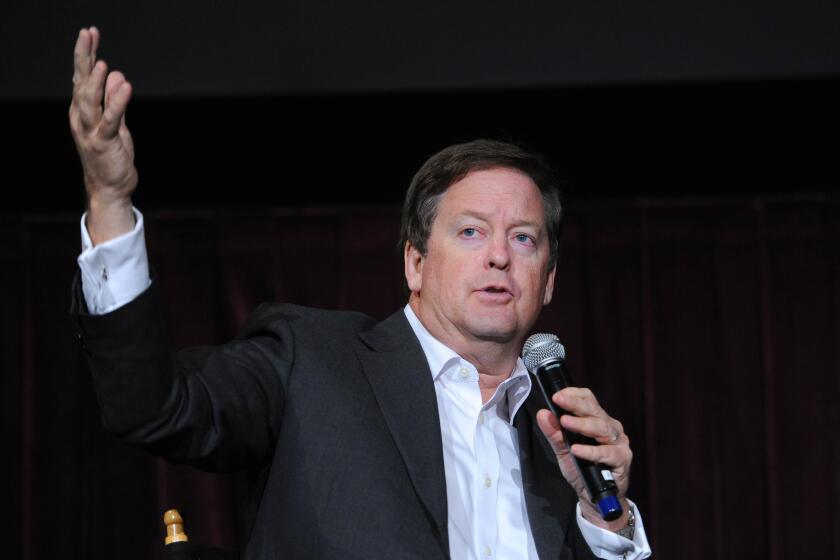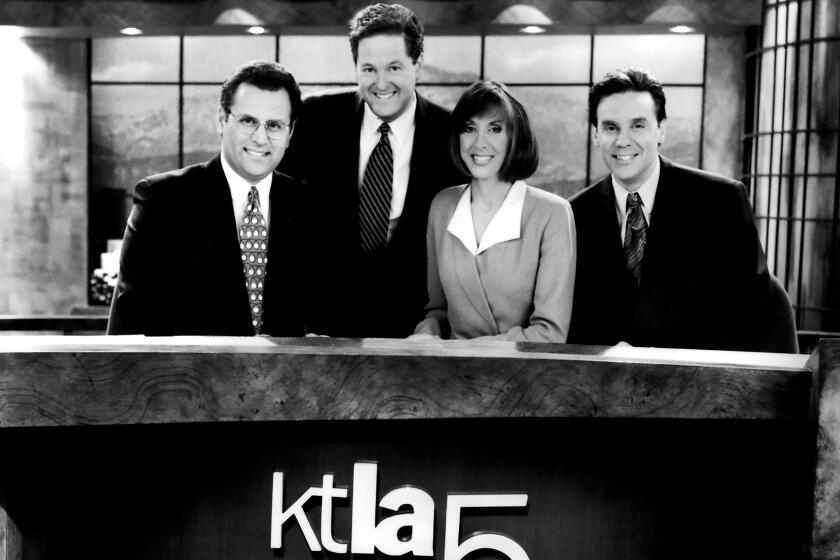Will the TV factory shape a new war?
The banners scream across cable news channels, network newsmagazines and even newspapers, sounding a lot like a western shootout that could co-star Burt Lancaster and Kirk Douglas: “Showdown With Saddam.” “Faceoff in the Gulf.” “Countdown: Iraq.”
If the U.S. is going to war in Iraq, as is widely assumed, the public will see and experience that event through the prism of television. And given the way TV molds material to suit its conventions, it’s worth knowing the rules of engagement for how a potential war will be filtered and processed.
Television has always been a visceral medium that specializes in “stories” told up close and personal. It’s why more complex issues struggle to find air time, while newsmagazines are transformed into single-topic mysteries with a dramatic narrative -- from “48 Hours Investigates” to “Dateline NBC’s” Court TV exclusives. This same impulse is also behind ABC’s “Profiles From the Front Line,” a flag-waving documentary series that premieres Thursday, slickly produced under the auspices of the network’s entertainment division. News, as a result, is usually no longer news in the old-fashioned, Walter Cronkite-tells-you-the-way-it-is sense; it’s “real-life drama,” in much the same way we accept various strains of so-called reality shows as sitcoms (think “The Osbournes”) or soap operas.
For all the talk about new formats, in fact, both viewers and TV executives have been programmed to file just about everything that spills out of the box into those familiar categories. So no matter how contrived the situations may be in a “Joe Millionaire” or “Survivor,” the audience can suspend disbelief and view the contestants as “characters,” at least for the time they’re watching.
The contestants have figured this out too. Trista Rehn, the “star” of ABC’s “The Bachelorette,” said last week that the producers’ priority was to make a satisfying TV show, not meticulously document what happened -- a trade-off she clearly accepted in exchange for her several hours of fame.
As these programs proliferate, the public finds it harder to discern where entertainment ends and real news begins, and most TV news operations -- by wrapping promotion for series like “Survivor” into their newscasts -- haven’t worked especially hard at maintaining a distinction. (Newspapers can be equally guilty, by the way, with New York tabloids covering such programs as “The Bachelor” -- taped months before -- as if they are live events, like the Super Bowl or Grammys.)
In addition, news is frequently described in entertainment terms, as if news must be tied to the appropriate movie analogy so people can digest it. In a recent USA Today article about the run-up to war, for example, MSNBC President Erik Sorenson said thanks to greater media access and improved technology, “This may be one time where the sequel is more compelling than the original.”
Without making too much of such word choices, they betray a mind-set that helps explain both the media’s coverage and the way viewers process it. If everything on TV approximates drama, it’s no wonder freeway chases -- just like “Bullitt” or “The French Connection” -- trump boring old newscasts.
Similarly, ABC is promoting “Profiles From the Front Line” as being from “the producer of ‘Black Hawk Down,’ ” an action-packed war film. It’s an implied comparison that has little to do with the series, which spent time tagging along with small special forces units operating in Afghanistan -- yielding footage generally lacking the pyrotechnics necessary to fulfill our movie-infused expectations.
“It wasn’t ‘Saving Private Ryan,’ ” noted Marine Capt. Jeffrey Pool, the media officer at Bagram Air Base who served as the military liaison while the show was in production. “That’s what everyone was hoping for.”
Pool added that he was “pleasantly surprised” to have his own preconceptions dispelled by the “Profiles” crew, who, he said, weren’t “a lot of L.A. types,” spending days out on missions with troops.
“We operated in the field as nothing but a documentary unit,” said Richard Mackenzie, a veteran documentarian (his credits include “Afghanistan Revealed”) who has spent 17 years working in the region. “We didn’t make agreements. We didn’t make promises. We were willing to put in the time.”
Indeed, remove the stirring musical score, and it’s not easy to distinguish “Profiles” from news coverage. For Mackenzie, who has worked for various news outlets, “That blurring of the lines is real interesting.”
That blurring, actually, has already become more of a blend, as Neal Gabler addressed in his book “Life the Movie -- How Entertainment Conquered Reality.” Gabler argues that entertainment values have grown so pervasive, news, politics and pretty much anything else must conform to them or risk irrelevance -- an environment that elbows serious news aside.
“The thing about serious anything is that it is seldom entertaining,” Gabler said when the book was released. “The threat in an entertainment society is that seriousness will be marginalized.” Gabler also wrote in the book that “no figure in the late-20th century journalism was more responsible for the merger of news and celebrity worship” than Barbara Walters, whose heavily promoted, end-of-sweeps “20/20” interview tonight with Robert Blake reflects how entwined news and entertainment have become.
Whatever happens in Iraq, then, after the initial crush of live coverage, we won’t be watching war per se but the ready-for-prime-time stories culled from it. There will be heroes and villains, loss and mourning, symbolic events and stirring pictures. And with three all-news channels now jockeying for attention, the competition -- and pressure to tell the best stories -- will be even more intense.
Yet as those stories unfold, they won’t exactly be “reality” in the unvarnished sense, but something swallowed by TV, chewed up and regurgitated back as entertainment.
Oddly enough, an equally cynical view was articulated last month on NBC -- not within its news but rather a TV movie, “War Stories,” conceived as a weekly series about foreign correspondents. In it, a jaded reporter tells a new arrival, “There’s no such thing as truth. That’s why we call them stories.”
Perhaps not surprisingly, the movie landed with a dull thud in the ratings opposite “American Idol,” “The Bachelorette” and “Star Search.” In an entertainment culture, even fiction can sometimes feel a bit too real.
*
Brian Lowry’s column appears Wednesdays. He can be reached at brian.lowry@latimes.com.
The complete guide to home viewing
Get Screen Gab for everything about the TV shows and streaming movies everyone’s talking about.
You may occasionally receive promotional content from the Los Angeles Times.



